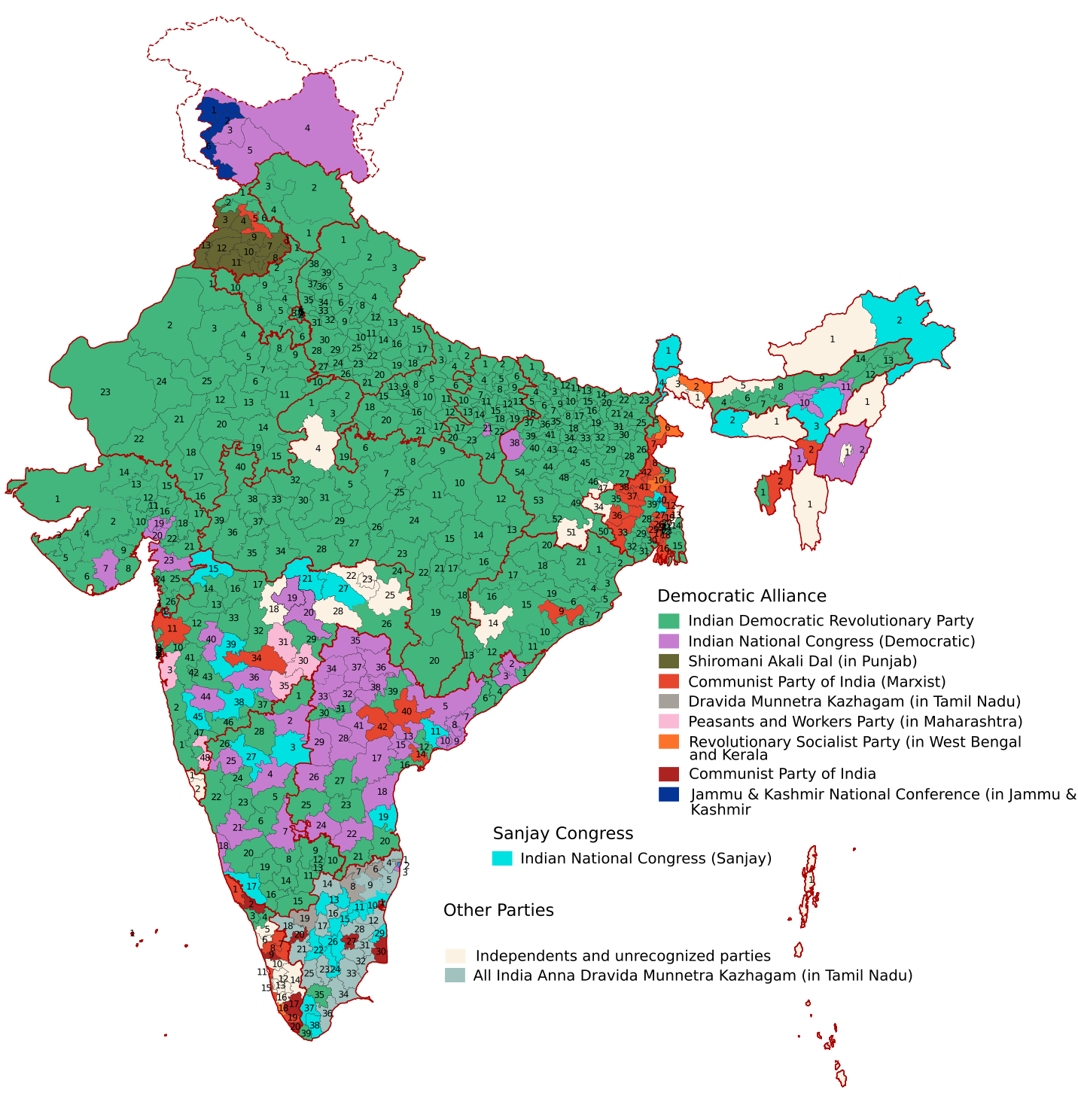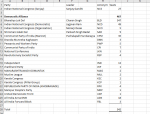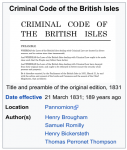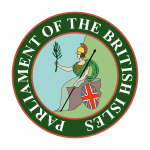Charter of Liberty and Security
Intituled, an Act Declaring the Civil and Religious Liberty of Freeborn Subjects of the Crown, and to secure and render more effectual certain acts of the reign of King Alfred, and of the fifteenth year of the reign of King John, and of the first year of the reign of King Edward the First, and of the fourth year of the reign of King Charles the First, and of the fifteenth year of the reign of King Charles the Second, and of the first year of the reign of King William the Third, and to prohibit their encroachment and extirpation.
WHEREAS civil and religious liberty, security, and preservation of property is necessary for the prosperity of the governed;
And WHEREAS the liberty of freeborn subjects ought to be made secure to prohibit their encroachment and extirpation;
And WHEREAS governments which ignored the liberty of freeborn subjects did extirpate the life, liberty, and property of their subjects, terrorize the people, and form tyrannies of the sword;
And WHEREAS by the dooms made in the reign of King Alfred and the witan of all the realm, the man in every hundred shall find twelve jury;
And WHEREAS by an act made in the fifteenth year of the reign of King John intituled 'The Great Charter of the Liberties of England,' it is declared and enacted the rights and liberties of all the Freemen of our Realm;
And WHEREAS by Cap. V of the acts made in the first year of the reign of King Edward the First in the first Parliament general after his coronation, no man shall disturb any to make free election;
And WHEREAS by an act made in the fourth year of King Charles the First intituled “The Petition Exhibited to His Majesty by the Lords Spiritual and Temporal and Commons in this present Parliament assembled concerning divers Rights and Liberties of the Subjects , with the King's Majesty's royal answer thereunto in full Parliament” sundry unlawful acts were condemned and divers rights and liberties were upheld, according to the laws and statutes of the realm;
And WHEREAS by an act made in the fifteenth year of King Charles the Second intituled “An Act for the better securing the Liberty of the Subject, and for Prevention of Imprisonment beyond the Seas” the security of the person from arbitrary government was assured, except in cases of emergency declared by Parliament;
And WHEREAS by an act made in the first year of the reign of King William and Queen Mary intituled “An Act declaring the Rights and Liberties of the Subject and settling the Succession of the Crown”, subjects were vindicated and assured their rights and liberties;
And WHEREAS by an act made in the first year of the reign of King William and Queen Mary intituled “An Act for Exempting their Majesties Protestant Subjects dissenting from the Church of England from the Penalties of certain Laws”, the restraints of the governors on the ability of a person to instruct his fellow persons on religious duties were removed;
And WHEREAS the expiration of an act made in the fourteenth year of the reign of King Charles the Second intituled “An Act for preventing the frequent Abuses in printing seditious treasonable and unlicensed Books and Pamphlets and for regulating of Printing and Printing Presses” did confirm the ancient right of the liberty of the press;
And WHEREAS divers Rights and Liberties are granted by the Forces of the Common Law and Custom of Time Immemorial;
And WHEREAS the civil and religious Liberty of freeborn Subjects ought to be consolidated into a single Charter and be rendered more effectual and secured against encroachment and extirpation;
Be it therefore enacted, by the Parliament of the British Isles upon the twenty-fourth day of January in the year of our Lord eighteen hundred twenty-nine, by and with the advice and consent of the Crown and Lords and Commons, that as follows:
Section 1. Definition of Scope
Article 1. Definition of Citizenship
All persons born in the British Isles and her overseas colonies and holdings; by which is meant Great Britain, Ireland, Jersey, Guernsey, the Isle of Mann, Scilly, and any other place under the authority of the Crown, or any Titles dependent therein, and such overseas Colonies and Holdings organized by Act of Parliament, or otherwise within the dominion of the laws of this country; or their children, or naturalised by Act of Parliament, are Freeborn Subjects, and they shall all have full ownership of the liberty thereof, as this Act may expound, provided always, that such persons that are attainted, or convicted for High Treason, or in the service of a current Enemy, may have such status revoked by Act of Parliament.
Article 2. Full definition of scope
All persons anywhere in the jurisdiction of the British Isles and her overseas colonies and holdings, or within such areas, garrisons, or places which are under the control of the Army or Navy, or within the jurisdiction of an agent of the Crown or a Court of Judicature, or under the rule or suzerainty of a Corporation under a Charter authorized by the Crown or Parliament, shall likewise enjoy the benefits of the Liberty of the British Subject, as this Charter may expound.
Section 2. Right to Life, Liberty, and Property
Article 1. General Right
All persons have the right to life, liberty and property, and no person shall be deprived of either but by the due process of law and the judgement of his peers.
Article 2. Habeas Corpus
All persons shall be allowed the right to Habeas Corpus as declared by Acts of Parliament unless duly convicted for High Treason, and this right shall not be suspended except by Act of Parliament in such time as there is actual invasion or rebellion on the soil of the British Isles, and no such suspension shall have continuance for more than one year.
Article 3. Right to Work only with Consent
By no one shall service in any shape be exacted of any person, without giving him in writing a sufficient acknowledgment thereof, and the consent of the person to the statement so contained, except for punishment for crime whereof the party has been duly convicted, or desertion from the Army or Navy under such terms as Parliament may provide.
Article 4. Right against Unreasonable Searches
All persons have the right to be secure from all unreasonable Searches, in their Person, House, Paper, and Possessions; and all Warrants shall therefore be supported by Oath or Affirmation, and shall have cause or foundation, accompanied by a special designation of the persons or objects of search, arrest or seizure, and shall be only issued by a Judge in cases and formalities prescribed by the law.
Article 5. Right to Bear Arms
All subjects of the British Isles have the right to use, carry, practice, and train in the use of arms as allowed by law for their individual and mutual security, so that the public peace may not be disturbed.
Article 6. Right against Forced Quartering
No person shall be required, without their consent, to receive soldiers in their houses, except in times of rebellion or invasion by order of a civil magistrate, in a manner prescribed by Parliament.
Section 3. Rights of the Accused
Article 1. General right
In all capital or criminal prosecution a person has a right to demand the cause and nature of his accusation, to be confronted with the accusers and witnesses, to call for evidence in his favour, and to a speedy trial by an impartial jury of his vicinage, without whose unanimous consent he cannot be found guilty, except in cases of impeachments.
Article 2. Access to Justice
To no one will we sell, to no one will we deny or delay right or justice.
Article 3. Innocent until proven guilty
Every person is by the law deemed innocent until convicted by the judgement of his peers and the law of the land, except in cases of impeachments.
Article 4. Double Jeopardy
No person shall be subject for the same offence to be twice put in jeopardy of life and limb.
Article 5. Right against Self-Incrimination
No court of law shall punish, or cause to be punished, any person or persons for refusing to answer questions against themselves in criminal cases.
Article 6. Right to Counsel
All persons accused of a crime shall have the right to assistance of counsel for their defence, and all indictments shall be presented to the accused.
Article 7. Right against Retroactive Punishment
No person shall be convicted for any offense except for violation of a law passed before the offense was committed.
Article 8. Right to Grand Juries in Crimes
No person shall be held to bail before the indictment of a Grand Jury except in impeachments, or in cases arising in land and naval forces, or in times of public danger.
Section 4. Rights of the Imprisoned
Article 1. Right to fair Punishment
Excessive Bail ought not to be required nor excessive Fines imposed nor cruel and unusual Punishments inflicted.
Article 2. Investigation of Mistreatment
All courts of law, and all magistrates, shall investigate gaols in their jurisdiction for mistreatment, and their findings shall be published in a freely distributed register.
Section 5. Right to Trial by Jury
Article 1. General Right
All Persons shall have the right to a jury of twelve persons in his vicinage, duly impaneled and returned by ballot from all persons eligible by law, to determine culpability for all cases, whether they be civil, criminal, or capital, save for impeachment, and juries are judges of law as well as fact, and no judge may rule contrary to their verdict.
Article 2. Prohibition on packing of juries
The packing of juries, whereby, standing bodies of jurymen are corrupted such that they manifest obsequiousness, is hereby abolished in all trials.
Article 3. Criminality of Interference in a Jury
The interference of a judge, magistrate, or any other functionary, or any other person, in the matters of a jury by punishment, or intimidation, or otherwise, is an offence.
Article 4. Powers of a Jury
Juries shall sit in the case to which it is assigned, and no session of a court shall be begin or continue without a jury, and they shall additionally observe all evidence which shall be presented to a court. Juries shall additionally have the power to question parties, witnesses, the judge, and any other actors in the judicial theatre, for any purpose it may consider necessary; and it may record whatever additional comments it may have on a trial on a journal, which shall only be made public at the end of a trial.
Article 5. Right of Jury Nullification
For all cases, the jury sworn to try the issue may give a general verdict upon the whole matter put in issue upon such case; and shall not be required or directed, by the Court or Judge before whom such case shall be tried, to find the person or persons so sued merely on the proof by such person or persons of the evidence, and of the sense ascribed to the same.
Article 6. Jury verdict
Upon the conclusion of a trial, the foreman of the jury shall present comments on the conduct of the trial, and if it should consider such conduct in error, he may declare the dissolution of the current trial and its substitution with another, which should take place at the next court of appeals. If it should not declare the trial's conduct in error, he shall present its verdict to the trial at large, along with advice to the judge on the sentence, and its opinion on the morality of the law at hand.
Article 5. Consecutive Restriction
Jurymen shall serve for no more than four consecutive juries.
Section 6. Rights of Parliament
Article 1. Holding of Parliament
For redress of all Grievances, and for the amending, strengthening, and preserving of Laws, Parliaments ought to be held frequently.
Article 2. Summoning of Parliaments
When a Proclamation of the Crown calls a meeting of Parliament, nothing should prevent or obstruct their meeting, and any returning-officer, bailiff, sheriff, or magistrate so guilty shall be punished by the law of the land.
Article 3. Freedom of Election
Elections ought to be free, without the interference of all undue influences from power, bribery, tumult, or other improper conduct, and no person by force of arms, malice, menacing, or otherwise, shall disturb any elector in their exercise of suffrage, and all hindrance is an offence against the law and constitution.
Article 4. Law and Custom of Parliament
Parliament subsists according to its own laws and customs for its directions; and it is the Law and Custom of Parliament, that all matters in any parliament moved, concerning the realm, ought to be determined, adjudged, and discussed, by the course of the parliament.
Article 5. Self-regulation
Parliament shall regulate its own Debates and Proceedings without any interference whatsoever.
Article 6. Freedom of Speech in Parliament
The making and maintenance of laws, and redress of mischiefs, and grievances which daily happen within this realm, are proper subjects and matter of counsel and debate in parliament, and in the handling and proceeding of those businesses, every Member of the Parliament has, and of right ought to have, freedom of speech to propound, treat, reason, and bring to conclusion the same.
Article 7. Non-prosecution nor questioning of MPs
The freedom of speech and debates and proceedings in Parliament ought not to be impeached or questioned in any Court or Place out of Parliament.
Article 8. Right to investigate
Parliament has the right to inquire in all matters of the Realm, to order the production of Documents, and to summon Witnesses to be examined under Oath.
Article 9. Freedom from molestation by executive and judiciary
Every member of Parliament has freedom from all impeachment, imprisonment, and molestation other than, by the censure of the house of Parliament itself, for or concerning any bill, speaking, reasoning, or declaring of any matter or matters, touching the parliament or parliament business.
Article 10. Non-punishment of Members of Parliament
All suits, accusements, condemnations, executions, fines, amercements, punishments, corrections, charges, and impositions at any time put, or had upon any member of Parliament, for any Bill, speaking, reasoning, or declaring of any matter or matters concerning the Parliament, are communed, or treated of, utterly void and of none effect, unless by the censure of the house of Parliament itself.
Article 11. Parliamentary Immunity
No Member of Parliament shall be required to attend before a Court or Tribunal, and no Member of Parliament shall be imprisoned or restrained without sentence or order of the House of Parliament.
Article 12. Freedom of access
Every Member of Parliament shall have freedom of access to the Crown whenever occasion shall require.
Article 13. Favourable construction
The most favourable construction shall be placed upon the deliberations of Parliament.
Article 14. Expulsion of Members of Parliament
Only the House of Commons has the right to expel its Membership.
Article 15. Contempt of Parliament
Only Parliament has the right to rule members or strangers in contempt and punish contemptuous persons as it sees fit for the duration of the session.
Article 16. Powers of Taxation
No tax shall be imposed, unless by the general council of the kingdom.
Article 17. Raising a Standing Army
The raising or keeping a standing army within the kingdom, unless with the consent of Parliament, is against law.
Section 7. Religious Liberty
Article 1. Freedom of Worship
All persons are free to worship God in the manner most agreeable to their own conscience, and no person shall be troubled, molested, or discountenanced in any way for or in respect of his or her religious profession or sentiments, nor in the free practice of religion, provided always, that he or she does not disturb the public peace, or obstruct others in his or her religious worship.
Article 2. Abolition of blasphemy
The trial of an indictment or information for the avowing and publishing of blasphemous and impious opinions contrary to the doctrines and principles of a religious order is hereby illegal.
Article 3. Non-discrimination in Government
No person shall be prohibited for their religious sentiments, or required to swear or solemnly affirm a condemnation thereof, or be induced to follow the doctrine, discipline, or practice of a religious order to serve in Parliament, or as an agent of the Crown, or as an officer of the judiciary, or as any other functionary, or at any place, trust, or employment relating to the government of the realm or any city, county, town, burgh, or cinque port.
Section 8. Liberty of Speech and Conscience
Article 1. General Right
The liberty of speech is among the great bulwarks of free government, and can never be restrained except by despotic governments; therefore, any person may freely speak, write, and publish his sentiments on all subjects.
Article 2. Prohibition of violation of free speech right
No court of law, no magistrate, shall punish, or endeavour to contribute to the punishing of, any person for having given utterance, or giving expression, or transferring, or the seizing, detaining destruction or damaging of any paper or other substance, of any discourse.
Article 3. Exceptions for Libel
Provided always, that for any great injury done to the reputation of any person by false imputations, every person concerned in the doing of such injury is responsible to the purpose of reparation at the suit and for the benefit of any injured, through the civil law of libel; and that, for anything which being so expressed, has for its object the exciting persons to the commission of an offence and has actually caused such an offence, any person shall be responsible as above, according to the nature of such offence.
Article 4. Abolition of criminal, seditious, and blasphemous libel
The trial of an indictment or information for the making or publishing any libel, and all cases for the making or publishing of libel where an issue or issues are joined between the defendant or defendants and the Crown, or the Great Men of the Realm, or religious Orders, are hereby abolished; and for all cases for the making or publishing of libel, the jury sworn to try the issue may give a general verdict upon the whole matter put in issue upon such case; and shall not be required or directed, by the Court or Judge before whom such case shall be tried, to find the person or persons so sued merely on the proof by such person or persons of the evidence charged to be a libel, and of the sense ascribed to the same in such cases.
Article 5. Security of Private Writings
No person shall have the security of his private writings infringed, except for the purposes, and on the occasions, and in the manner, determined and declared by the law.
Article 6. Keeping writings from Owners
No writing shall, against the will, known or reasonably presumable of the owner, be carried or kept out of his custody or power, or be seized, destroyed, damaged, or inspected, by or by order of any person in authority: unless it be in pursuance of the order of a Magistrate in the manner prescribed by the law of the land.
Article 7. Damages to writings
In case of such oppressive seizure, destruction, damnification, or inspection, any person concerned in the infliction of the injury shall be responsible to the purpose of pecuniary compensation, with or without ulterior punishment, as the case may require.
Section 9. Right to Censure the Government
Article 1. General Right
All persons have the right to censure their Governors, to judge their Actions, and their judgements and grievances may be peaceably expressed as they see fit.
Article 2. Right to examine governmental proceedings
All persons have the right to examine the proceedings of both Houses of Parliament and of the Courts, without restrictions except in cases of emergency mandating secrecy, and Parliament and the Courts shall allow free admittance of the Public to their Sessions with limits set by Law, and the Register of the Realm shall be published in a Gazette freely distributed to all Towns and Counties in the British Isles.
Article 3. List of the Imprisoned
The names of all persons deprived of liberty by imprisonment shall be posted on the door of the court-house in which they were so sentenced, and on the door of the gaol in which they are detained, and in a freely distributed register.
Article 4. Liberty of the Press
All persons are at liberty to distribute their judgements on the actions of the government freely through the press, without the imposition of licensing, or duties, or acts otherwise with the effect of National Gagging.
Article 5. Abolition of taxes on knowledge
For the progress of science or art, of social improvement, and of knowledge, all taxes and duties on the manufacture of paper, and on pamphlets, or papers, parts, or numbers, are hereby abolished; and no stamp shall be imposed on the publication of the same.
Article 6. Right to Petition
All persons have the right to petition the Crown or a Member of a House of Parliament for a redress of grievances.
Section 10. Right of Assembly
Article 1. General Right
All persons have the right to assemble, except in cases endangering the public peace.
Article 2. Prohibition of obstruction
No persons shall be obstructed by force, intimidation, or deceit, from meeting in any number, in any place in which they have individually any right to station themselves, particularly while in the act of making communication of such their observations, and the opinions and wishes suggested by them.
Article 3. Cases for Dissolution
Provided always that if for the prevention of evil to person or property, in cases of unlawful, riotous, and tumultuous assembly, it shall be thought good by the magistrate, for limited time, by proclamation in exact form set by law in such manner as may be heard by the whole crowd, to prevent or inhibit persons at large from making assembly in numbers greater than are capable of hearing from beginning to end, the discourse of the same speaker at the same time.
Article 4. Investigations
All deaths and serious injuries from the dispersal of an assembly shall be investigated by courts of law for unlawful action, and their findings shall be published in a freely distributed Register.
Section 11. Rights of Property
Article 1. General Right
All persons have a sacred and inviolable right to their property, and no person shall have his property alienated for public use without just compensation established by Act of Parliament.
Article 2. Sanctity of the Home
Every person’s house is a castle and fortress to defend against injury and violence, to ensure the security and safety of himself and resident inmates; and at no time shall an agent of the Crown, or an officer of the judiciary, or any other functionary, break or forcibly enter into a dwelling-house, except with a legal warrant issued by a judge as part of a criminal process.
Article 3. Sanctity of Corporate Property
All corporate property vested in trust for public and general uses, and all possessions and which cannot be inherited, nor descend by right to specific successors, nor be alienated by deed or will, shall be regulated, controlled, and appropriated solely by Act of Parliament.
Article 4. Illegality of violence to property
All injury and violence to property, for any cause whatsoever, is illegal and repugnant to the constitution.
ASSENTED by his Lordship Henry Vassal-Fox, Baron Holland, the Lawful Lord Chief Magistrate of the British Isles and her overseas Colonies and Holdings
SEALED by his Excellency Samuel Romilly, Keeper of the Great Seal of the British Isles.



















